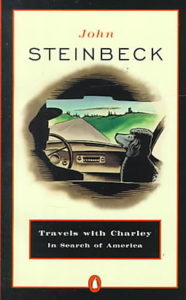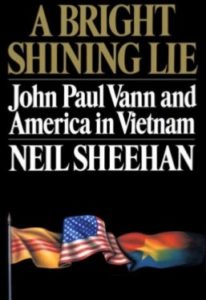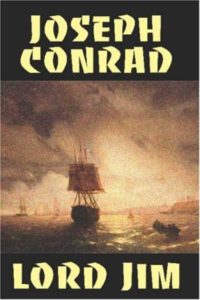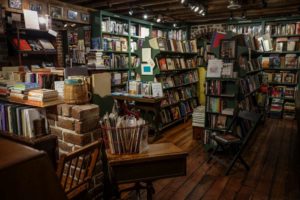What’s it like to oversee and take care of Savannah’s hauntingly beautiful historic cemeteries? This week’s guest is the man responsible for taking care of those important cultural and historic resources, Sam Beetler, Savannah’s Cemetery Conservation Coordinator. Enjoy!
Category Archives: Places
What I’m Reading Now: August 14, 2018
 John Steinbeck, Travels with Charley: In Search of America (1962, Penguin Books, 277 pp.)
John Steinbeck, Travels with Charley: In Search of America (1962, Penguin Books, 277 pp.)
John Steinbeck is considered to be one of the foremost authors of the 20th century, keeping company with Hemingway, Faulkner, and Fitzgerald. Most of us make our first (and perhaps only) contact with Steinbeck in Of Mice and Men (1937) in high school, or in The Grapes of Wrath (1939), for which he won the 1940 Pulitzer Prize for fiction.
In 1962 he won the Nobel Prize for literature, though many thought his best work was decades behind him. He died in New York five days before Christmas in 1968, nearly 50 years ago, at age 66.
Long before “On the Road” with Charles Kuralt, and three years following Jack Kerouac’s novel of the same name, Steinbeck set out in the fall of 1960 to re-connect with America and its people. Having lived and worked for so long in New York, he felt he’d lost touch with “real” Americans.
In order to travel anonymously as much as possible so that people would talk freely with him, Steinbeck bought a three-quarter-ton pickup truck, had a camper built for its bed, christened it “Rocinante” after Don Quixote’s famous steed, and set out on the highway with his French poodle Charley on a trek that took him from Maine to California. The camper kept him from signing hotel registers, and he claims never to have been recognized by sight.
Along the way he met and talked with ordinary people, slept in Rocinante under the stars and found that the America of his youth and that he had always believed in was still out there. He visited New Hampshire farmers and Yellowstone National Park, always with Charley as his faithful companion: “It is my experience that in some areas Charley is more intelligent than I am, but in others he is abysmally ignorant. He can’t read, can’t drive a car, and has no grasp of mathematics. But in his own field of endeavor, the slow, imperial smelling over and anointing of an area, he has no peer. Of course his horizons are limited, but how wide are mine?”
He published the results in 1962 as a work of non-fiction, and critics raved that it was his best work in years. It’s great fun to read, and you can still see the truck and Rocinante at the National Steinbeck Center in Salinas, California.
But is it really non-fiction? A few years ago a dedicated researcher uncovered that most of it wasn’t, that Steinbeck slept many nights not in Rocinante but in luxury hotels, that the characters and dialogue were largely fiction, and that not only Charley but also his wife Elaine accompanied him much of the way.
This may all be true, but I’m not sure it really matters. What Steinbeck describes—and what he claims that he found universally among the people he met along the way—is a longing and a desire to get away from where we are, to go elsewhere, to be somewhere, anywhere, rather than where we are. “They spoke quietly of how they wanted to go someday, to move about, free and unanchored, not toward something but away from something.”
That still seems as true now—for us an individuals and maybe for the country as a whole—as when Steinbeck wrote it nearly 60 years ago. Even as I read, I fell into the trap of thinking that the early 1960s seemed preferable to the times in which we live, that Steinbeck’s America wasn’t filled with hyper-wired know-it-alls who are divided hopelessly into partisan tribes.
But of course I know better. The past always looks seductively more understandable and simple than our own times, just as another geographic space seems to offer more or less, depending on what you want, than where we stand now.
Travels with Charley—be it fiction or non-fiction—confirms that humans as individuals and as nations are universally restless and unsatisfied, that we always want to go someplace else—in time and/or space—that promises either to bring something back that’s missing or to offer a more fulfilling life than the one we live now. Isn’t this why I play the lottery every week?
As Steinbeck wrote and acknowledged himself, “our capacity for self-delusion is boundless.”
What I’m Reading Now: July 17, 2018
 A Bright Shining Lie: John Paul Vann and America in Vietnam, by Neil Sheehan (Random House, 1988, 861 pp.)
A Bright Shining Lie: John Paul Vann and America in Vietnam, by Neil Sheehan (Random House, 1988, 861 pp.)
“Rage — Goddess, sing the rage of Peleus’ son Achilles,
murderous, doomed, that cost the Achaeans countless losses,
hurling down to the House of Death so many sturdy souls,
great fighters’ souls, but made their bodies carrion,
feasts for the dogs and birds.”
So begins Robert Fagles’ elegant translation of Homer’s Iliad, the 3,000-year-old account of the Trojan War, and from that day to this, humankind has sought in vain to understand the tragedy and futility of war.
Few armed conflicts seem more futile in retrospect or more difficult to understand now than the Vietnam War. It took Ken Burns 18 hours to attempt to explain it in his recent 10-part documentary, though it’s well worth watching.
Even if you’re interested in military history it can be a difficult thing to wrap your mind around, as the names and geography are unfamiliar and the fighting unconventional. Behind it all lurks the geo-politics of the Cold War and the turmoil of 1960s America, which is why many written accounts of the era are doorstops as well: check out David Halberstam’s The Best and the Brightest (1972) and Stanley Karnow’s Vietnam: A History (1983).
More recently, in the June 7 New York Review of Books, Robert Kaiser reviewed Max Boot’s new account of the war, The Road Not Taken: Edward Lansdale and the American Tragedy in Vietnam. He praised it as masterful but called Neil Sheehan’s A Bright Shining Lie, written 30 years ago, “still the best book on the Vietnam War.”
Few wars ever had a better scribe than Neil Sheehan. His account of America’s “great clash of arms” in southeast Asia that killed more than 58,000 Americans and several million Vietnamese is epic indeed. Sheehan was awarded the 1988 National Book Award for Nonfiction and the 1989 Pulitzer Prize for General Non-Fiction for his achievement.
In order to explain the gargantuan struggle, Sheehan focused on the conflict through the eyes of one man, John Paul Vann, himself a tragic figure. Vann was a lieutenant colonel in the U.S. Army voluntarily sent to Vietnam as an advisor in 1962. He became convinced early on that America’s strategy of a big war fought in the style of World War II, with a focus on body counts and bombing runs, would never work against such a dedicated foe as the North Vietnamese.
Every attempt Vann made to send back a true account of the war met official censorship from higher-ups who denigrated all negative reports as bad for homefront morale that would stymie the brass’s call for ever larger numbers of American troops. By 1967 Vann was advising his superiors that the war as fought would never be won, but no one in authority—from General William Westmoreland to Defense Secretary Robert McNamara to LBJ himself—wanted to be accused of “cutting and running.” If we didn’t stop the Commies in Saigon, President Johnson warned, we’d have to fight them on the beaches of Hawaii and then California.
So the war went on and on, with the draft and social unrest, more Americans fighting in a place many couldn’t find on a map, more bombing, more atrocities, more civilian casualties, more POWs, and little sense of what victory would ultimately mean against a foe that would not surrender. The imaginative military thinking that had defeated the Nazis and Japanese in three and a half years had become complacent and arrogant, unwilling to believe that such a crude people in an underdeveloped country could resist the greatest military power on earth.
The most interesting part of the narrative is John Paul Vann himself, a man driven to succeed at the highest levels while haunted by personal demons that would have crippled lesser men. He died in a helicopter crash in 1972 and was buried at Arlington, his sacrifice and those of thousands of his comrades seemingly in vain.
It’s impossible to read this book now without the shadow of America’s 16-year wars in Afghanistan and Iraq looming large in the background. There is no draft now, thus no social unrest at home and no urgency to end them. These two seemingly endless conflicts, in which final “victory” still cannot really be defined, goes on and on, exacting “countless losses, hurling down to the House of Death so many sturdy souls, great fighters’ souls, their bodies carrion, feasts for the dogs and birds.”
In three thousand years, has very much changed?
What I’m Reading Now: July 10, 2018
 Lord Jim: A Tale, by Joseph Conrad (1900; Easton Press Edition, 407 pp.)
Lord Jim: A Tale, by Joseph Conrad (1900; Easton Press Edition, 407 pp.)
I was reminded very recently that fifteen years ago, when one of my colleagues first came to work at the Georgia Historical Society, I asked her what she was currently reading. She told me, and—according to her—I responded with just two words, dripping, she says, with judgment: “Ah. Fiction.”
I’d like to be able to deny this as wholly out of character for me, but alas, I cannot. At that time and for the preceding fifteen years at least—through all my years in graduate school—I read non-fiction almost exclusively, usually history or biography. It wasn’t that I looked down my nose at fiction, there were just too many non-fiction books that I felt I had to read. So many books, so little time.
Five years after that—about ten years ago—I was reading one of Nicholas Basbanes’ books about book collectors and the treasures they sought, when I finally realized that my reading life and education were woefully deficient because I’d never read most of what are considered the “great books,” almost all of which, incidentally, are fiction. I had read a few in high school, but that hardly counted. That had to change.
Being very deliberate about such things, I wanted to go about the task systematically, so I subscribed to the Easton Press list of the “100 Greatest Books Ever Written.” Starting with Huckleberry Finn, I began receiving a handsome, leather-bound volume—complete with moiré endpapers and silk bookmark—in the mail each month. They made a handsome new edition to my library too.
Thus began a new chapter in my reading life. What might have seemed like drudgery in my teens has been one of the most enjoyable experiences imaginable.
The list was of course highly subjective and carried the usual caveats, being heavily Euro- and male-centric. If I had to rank them in terms of how much I enjoyed them, I’d put Henry Fielding’s Tom Jones somewhere near the top, while some of the titles I wouldn’t have placed on any list of “great” books, if by “great” we mean outstanding works of literature or works of art. Charles Darwin’s On the Origin of Species is undoubtedly an influential book, but in my uninformed opinion it is not a great work of literature–not because of the subject but because it’s too bloody hard to read. It’s like trying to read Isaac Newton’s Principia Mathematica or Christiaan Huygens’ Treatise on Light—both are very important books, but not books you’d give to Uncle Murray for Christmas.
After a decade, I have only thirteen more to go. It should go without saying that I won’t stop reading the great works of literature when I’ve read all 100. This is just the beginning.
Number 88 on the list (and they are sent randomly, not ranked) is Joseph Conrad’s Lord Jim. Conrad was born in the Ukraine, and the man hailed as one of the great English novelists didn’t learn the language until he was 21. He wrote Lord Jim when he was 41.
The story is a simple one, yet it goes to the heart of what it means to be human, and which we’ve explored in other books this year: What is it that creates our identity? Are we bound by the events of our past, doomed forever by the mistakes we’ve made, or can we begin life anew by force of will?
Jim is the first mate on board the steamship Patna, carrying 800 pilgrims of faith to a port in the Red Sea. After the ship hits an object and begins taking on water, Jim and most of the crew abandon ship, leaving the pilgrims to face a watery grave. After the crew is picked up a few days later, they learn that the Patna didn’t sink and was instead brought safely into shore. The crew are all vilified, the captain commits suicide, and Jim spends the rest of his life trying to live down the shame of what he’s done. It defines him for the rest of his life.
Jim drifts from place to place, finding work here and there, but always having to flee in disgrace after meeting someone who knows about the Patna. “To fling away your daily bread so as to get your hands free for a grapple with a ghost may be an act of prosaic heroism . . . all his recklessness could not carry him out from under the shadow. There was always a doubt of his courage. The truth seems to be that it is impossible to lay the ghost of a fact. You can face it or shirk it—and I have come across a man or two who could wink at familiar shades.”
His misery follows him relentlessly until he lands on a remote island, where the natives call him “Tuan Jim” or Lord Jim. Does he at last find a measure of redemption before his death?
Conrad in all of his work was deeply pessimistic about human nature, and though he wrote quite a few sea stores, this one is at its heart about what happens to a man with a haunted and hunted soul who is ultimately running from—and warring with—himself.
It is one of the themes that runs throughout the Great Books. Perhaps another novelist, Nancy Wilson Ross, herself an expert on Eastern religions, framed this eternal dilemma best: “When man conquers space, his ancient, universal and perpetual problem will remain the same as it has been from the beginning—to conquer himself.”
What I’m Reading Now: July 3, 2018
A ll Heaven and Earth in a Bookstore
ll Heaven and Earth in a Bookstore
This week we take a break from discussing current reading to talk about another favorite book-related topic: the joys of the used book store.
Long-suffering readers of this blog have read about the wonders of the used book sale, which usually only happens once a year. A great used bookstore brings that wonder all the year round.
Like the brick and mortar retail bookstores, used bookstores are an endangered species. There used to be one in nearly every town, but not so anymore.
I have written before about the legendary Oxford Too in Atlanta’s Peachtree Battle shopping center, which like its parent Oxford Books closed in 1997. The Old New York Book Shop in Atlanta, owned by Cliff Graubert, was another favorite, as was Smythe Books in Dunwoody, owned by my friend Jim Strawn. Both of the latter two are still operated out of the basements of the homes of their owners, and you can call them and peruse their wares by appointment, or find them on the Internet.
As an undergraduate at the University of Georgia, I well remember discovering Jackson Street Books in Athens after it opened in 1984. Their history and biography section was a gold mine for an aspiring historian, as so many of the UGA faculty disposed of unwanted books there. Alas, the store closed in 2016 after 32 years in business.
There are still some great used bookstores around Georgia, however. This is by no means a complete list, just three of my favorites: the Golden Bough in Macon if you’re traveling on I-75, E. Quinn Booksellers in Blue Ridge when you’re up in the mountains (say hello to Mike when you go), and our very own Book Lady right here in Savannah.
A few years ago I made a quick trip to New York and ran out of time before I could visit the Strand, the mecca of all used bookstores at Broadway and 12th. But when in Boston I did visit Commonwealth Books and the Brattle Book Shop in Boston, two legendary venues as well.
Back in 2009 I was planning a business trip to Washington, D.C., and was going to have an entire day free in the middle of the week. Readers of this blog know I’m a huge fan of Washington Post book critic Michael Dirda. I sent him an email at the Post and asked what used bookstores he’d recommend in the D.C. area, figuring he wouldn’t write back.
He did, immediately, and sent me a complete list of his favorites, including Second Story Books, a cavernous book warehouse out in Rockville, Maryland, where he lives. When my free day came, I took the Metro Red Line to the penultimate stop in Rockville, just before Shady Grove, walked a mile to the warehouse, and spent several blissful hours perusing the stacks. I had to ship everything home, but it was worth every penny.
Just yesterday I spent a rainy afternoon in my friend Joni’s Book Lady Bookstore on Liberty Street, and found several treasures.
My first pickup was The Golden Argosy: A Collection of the Most Celebrated Short Stories in the English Language (1955), which contains such classics as Stephen Vincent Benet’s “The Devil and Daniel Webster,” Rudyard Kipling’s “The Man Who Would Be King,” and Thomas Wolfe’s “Chickamauga.” I’ve been looking for this one for years, and there it was, for only $7.50.
I also found Peter Ackroyd’s The Life of Thomas More (1998), The Church & The Age of Reason, 1648-1789 by Gerald R. Cragg, Jonathan Green’s Chasing the Sun: Dictionary Makers and the Dictionaries They Made (1996), and Arthur M. Schlesinger, Jr.’s massive Robert Kennedy and His Times, the 1978 doorstop that weighs in at well over 1,000 pages, just in time for me to read at the 50th anniversary of RFK’s death. In hardback, yet. Five books at $46 total: taint bad, Magee.
Well, you say, used bookstores are okay, but I can buy anything I need, used or new, on the Internet—or better yet, I can download almost any book immediately to my Kindle. And so you can.
But if you truly love the printed word, there is nothing like the serendipity of browsing the stacks of a used bookstore. As a book collector, and truly, as a reader, the hours I’ve spent in these vanishing guardians of literary gold have been among some of the happiest of my life.
Christopher Morley said it best, in his great homage to the book, Parnassus on Wheels: “When you sell a man a book you don’t sell him just twelve ounces of paper and ink and glue – you sell him a whole new life. Love and friendship and humor and ships at sea by night – there’s all heaven and earth in a book, a real book I mean.”
I agree.
